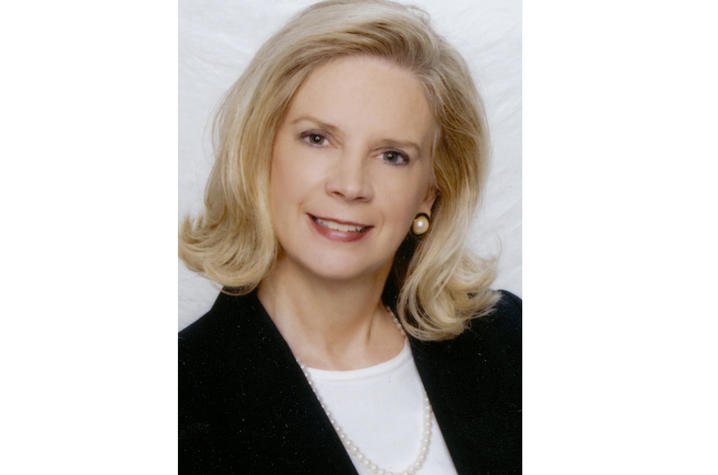UK Alumna Lynn Harrelson Volunteered at the Kentucky COVID-19 Hotline

LEXINGTON, Ky. (May 28, 2020) — University of Kentucky faculty, staff, students and alumni have answered the call for help in many ways during the COVID-19 pandemic. That includes alumna Lynn Harrelson who was supposed to be in Egypt when the coronavirus pandemic broke.
Instead, she and her husband canceled their trip a week or so before they were to leave in anticipation that things would turn out as they did. She stayed in Kentucky and volunteered to answer the phones at the Kentucky Poison Control Center dedicated to the COVID-19 Disease Control Hotline and answered varied questions about the callers' concerns in dealing with COVID-19.
Harrelson, who earned a bachelor’s degree in pharmacy from UK in 1973, is the owner of Senior Pharmacy Solutions, a consulting firm for seniors and others taking multiple medications in Louisville, and greater Kentucky and Indiana. Some of her patients also live outside the states.
“We help patients use their medicines in better, more optimal ways, so they have fewer side effects, better results but most importantly delay the possible need to go to the hospital,” she says.
With Kentucky’s college students away on Spring Break — and then later home after on-campus classes were moved to remote learning — Harrelson volunteered to step in and answer questions from callers who could no longer get to their doctors, needed help or just clarification of what they needed to do to protect their health or that of their community. She said many just needed guidance, direction and reassurance.
“Having worked in health care for so long, and having helped with other national emergencies, I saw the train wreck that was coming, which is why I wanted to answer the phone calls,” Harrelson says. “I was anxious to help.”
The COVID-19 Hotline interfaced within the Kentucky Poison Control Call Center.
“Both units were very busy with calls. And like with the Poison Control Call Center, we would get calls from the entire state. People calling in asked all kinds of questions about what to do, how to do it and who to contact,” says Harrelson, a UK Fellow and member of the UK Alumni Association Board of Directors as the College of Pharmacy Representative. “The staff supervising and working at the call center also supervised the COVID-19 volunteers and updated the information daily — or more frequently if needed — that the volunteers used as reference to share with those who called the hotline. This information always changed overnight.
“We didn’t want people going to the hospital or just showing up at their health care provider’s office. If they sought care and wanted to see their doctor, then they were encouraged to call them with information that their health care provider would need to review. As volunteers, we coached them about what they needed to consider about their health and share with their health care providers. Many just needed to learn what to do in the early roll out of our state dealing with COVID-19. Many times it was questions about where to go for specific information. It’s nice if I can do something to help calm people, because stress can make them more anxious. Being a calming factor is a great way to serve as a volunteer.”
Harrelson usually worked a 3-10 p.m. shift. At 5 p.m. the calls slowed, she says, while Gov. Andy Beshear gave his daily news briefing.
“As soon as he got finished, it goes gangbusters. I just kept answering more of the same questions about what to do and how to monitor their health and what to share with health care providers.” she says. “I understand the incoming calls are better now. But we were so busy at first. And I’ve had so much positive feedback. It makes me feel like this was one of the greatest things I’ve done in my life, bringing comfort at a time of uncertainty.”
Harrelson says the COVID-19 situation has also allowed pharmacists to expand their role in health care.
“I’m really proud of my profession and my state. I’ve been proud of my pharmacy school forever. It was in the top five when I graduated (now ranked No. 6),” she says. “We have pharmacists who are taught to work in very creative ways, and we just haven’t always been utilized as much as we can be to improve the health of the public we serve. This is an opportunity to be able to do different things in different ways and show people that we’re not the traditional pharmacists depicted in TV or in commercials. It has allowed us to spread our wings and be more involved in the health care of the people we serve.”
As the state’s flagship, land-grant institution, the University of Kentucky exists to advance the Commonwealth. We do that by preparing the next generation of leaders — placing students at the heart of everything we do — and transforming the lives of Kentuckians through education, research and creative work, service and health care. We pride ourselves on being a catalyst for breakthroughs and a force for healing, a place where ingenuity unfolds. It's all made possible by our people — visionaries, disruptors and pioneers — who make up 200 academic programs, a $476.5 million research and development enterprise and a world-class medical center, all on one campus.




